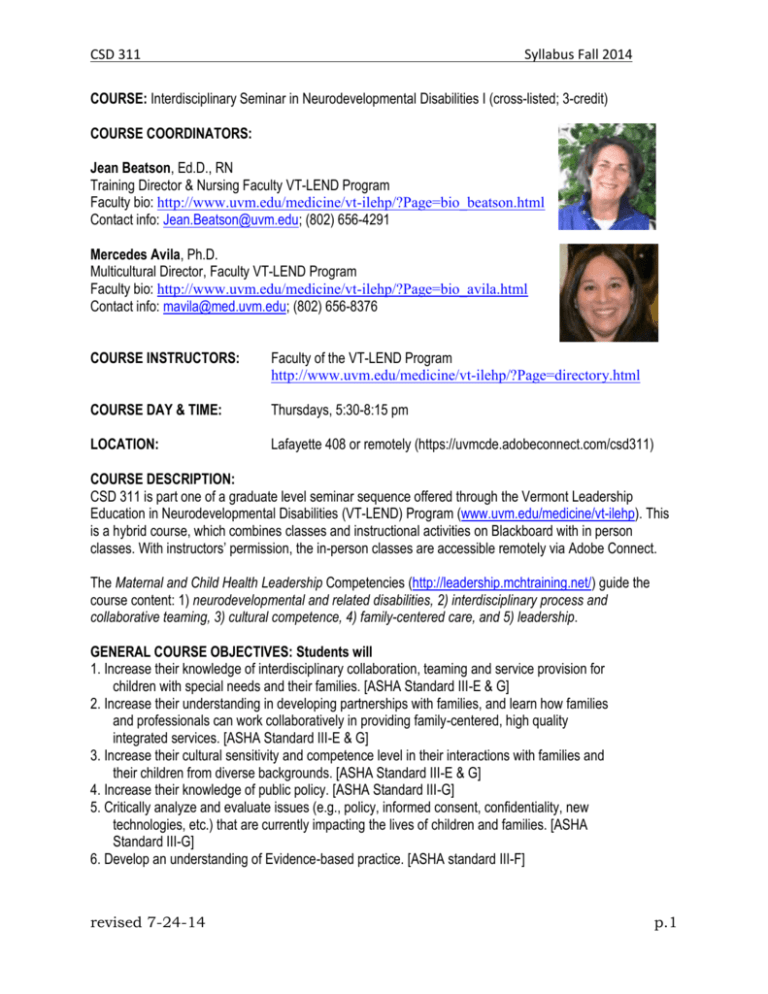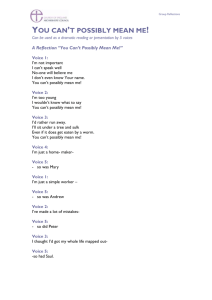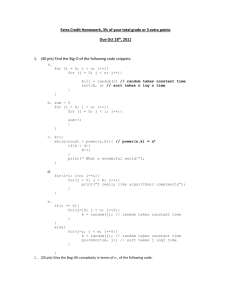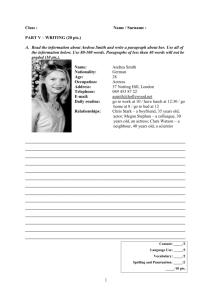course coordinators - University of Vermont
advertisement

CSD 311 Syllabus Fall 2014 COURSE: Interdisciplinary Seminar in Neurodevelopmental Disabilities I (cross-listed; 3-credit) COURSE COORDINATORS: Jean Beatson, Ed.D., RN Training Director & Nursing Faculty VT-LEND Program Faculty bio: http://www.uvm.edu/medicine/vt-ilehp/?Page=bio_beatson.html Contact info: Jean.Beatson@uvm.edu; (802) 656-4291 Mercedes Avila, Ph.D. Multicultural Director, Faculty VT-LEND Program Faculty bio: http://www.uvm.edu/medicine/vt-ilehp/?Page=bio_avila.html Contact info: mavila@med.uvm.edu; (802) 656-8376 COURSE INSTRUCTORS: Faculty of the VT-LEND Program http://www.uvm.edu/medicine/vt-ilehp/?Page=directory.html COURSE DAY & TIME: Thursdays, 5:30-8:15 pm LOCATION: Lafayette 408 or remotely (https://uvmcde.adobeconnect.com/csd311) COURSE DESCRIPTION: CSD 311 is part one of a graduate level seminar sequence offered through the Vermont Leadership Education in Neurodevelopmental Disabilities (VT-LEND) Program (www.uvm.edu/medicine/vt-ilehp). This is a hybrid course, which combines classes and instructional activities on Blackboard with in person classes. With instructors’ permission, the in-person classes are accessible remotely via Adobe Connect. The Maternal and Child Health Leadership Competencies (http://leadership.mchtraining.net/) guide the course content: 1) neurodevelopmental and related disabilities, 2) interdisciplinary process and collaborative teaming, 3) cultural competence, 4) family-centered care, and 5) leadership. GENERAL COURSE OBJECTIVES: Students will 1. Increase their knowledge of interdisciplinary collaboration, teaming and service provision for children with special needs and their families. [ASHA Standard III-E & G] 2. Increase their understanding in developing partnerships with families, and learn how families and professionals can work collaboratively in providing family-centered, high quality integrated services. [ASHA Standard III-E & G] 3. Increase their cultural sensitivity and competence level in their interactions with families and their children from diverse backgrounds. [ASHA Standard III-E & G] 4. Increase their knowledge of public policy. [ASHA Standard III-G] 5. Critically analyze and evaluate issues (e.g., policy, informed consent, confidentiality, new technologies, etc.) that are currently impacting the lives of children and families. [ASHA Standard III-G] 6. Develop an understanding of Evidence-based practice. [ASHA standard III-F] revised 7-24-14 p.1 CSD 311 Syllabus Fall 2014 SPECIFIC CLASS OBJECTIVES: Specific class objectives have been defined for each seminar topic and will be posted to Bb one week before the scheduled class. REQUIRED BOOKS for BOOK REVIEWS: Fadiman, A. (1997). The spirit catches you and you fall down: A Hmong child, her American doctors and the collision of two cultures. NY: Farrar, Straous & Giroux. Ehrenreich, B. (2001). Nickel and Dimed: On (Not) Getting By in America. Holt Paperback, NY. DESCRIPTION OF ASSIGNMENTS Note: There will be a 10% reduction in grade for each late assignment unless the student has asked for and was granted an extension prior to the assignment due date. 1. Attendance and Participation (16 points) In-person classes: Students are expected to attend all in-person classes (11) and actively participate in class discussions (1 point per class). To obtain their point students are expected to: o Attend class & actively participate o Come prepared and ready to relate the assigned readings and any questions posed by the presenters to the topic of discussion Students may miss 1 class without penalty. Students who miss more than 1 class will lose 1 point for each additional class missed unless they write a 2-page paper summarizing the content of the required readings and respond to the competency reflections (see description below) to obtain their participation point. Please email the course coordinators if you will miss class. Blackboard-only classes: For the classes entirely on Bb, students are expected to complete all the class activities by the deadline posted for each class in Bb. Completion of all activities and the class survey will yield 2 points per class for a total of 4-points. 2. Competencies Reflections (9 points) Students will respond to a reflective question between each “in-person” class (noted in the class schedule as occurring at UHC). These will be posted on Bb. Go to that week’s class folder, click on Competency Reflections, and it will take you directly to the correct discussion board forum. No competency reflection after the last class. Assignment Goals: To deepen students’ awareness and understanding of the class topics as these related to the 5 MCH competencies. Content and Format: By the end of each in-person class, the course coordinator will post a competency reflection question on Bb. You are required to post one reflection in response to the question. Before you post, read other people’s responses, if any, to the week's question and comment on these threads using reply. If your thoughts about the question are not reflected in the discussion threads created by classmate, create a new thread to add your thoughts. Your posts must be thoughtful, thought provoking and substantive. revised 7-24-14 p.2 CSD 311 Syllabus Fall 2014 You are encouraged to add resources related to the week’s questions/topic to enhance thinking. You are responsible for posting by the Tuesday (11:59pm) following class. 3. Book Review 1 (20 points) Students will read: Fadiman, A. (1997). The spirit catches you and fall down: A Hmong child, her American doctors & the collision of two cultures. NY: Farrar, Straous & Giroux. Assignment Goals: To increase students’ awareness and understanding of: 1. the impact of cultural differences and perspectives on health, disability, & care 2. models for cultural competence in the helping professions 3. practice changes they could implement designed to foster growth in the journey of cultural competence. Content and Format: Prepare a paper of no more than 5 pages, double-spaced, 1-inch margins and 12-point font. First write a brief introduction (one paragraph) to the paper, then using the following questions as sub-headings in the paper, please answer the following: a. Describe the child with the chronic health condition and the child’s family (5 points) b. Explain and analyze the different health perspectives that affected the care of the child and the interaction with the child’s family (10 points) c. Reflect on your ‘key’ learning and specifically state how you will change your practice in serving children with chronic health conditions or special needs & their families based on this new knowledge (5 points) 4. Book Review 2 (20 points) Students will read: Ehrenreich, B. (2001). Nickel and Dimed: On (Not) Getting By in America. Holt Paperback, NY. Assignment Goals: To increase students’ awareness and understanding of: 1. the specific challenges experienced by those living in poverty 2. the issues faced by the 'working poor' 3. available resources 4. how providers in the helping professions could better serve families challenged by poverty Content and Format: Prepare a paper of no more than 5 pages, double-spaced, 1-inch margins and 12-point font. First write a brief (one paragraph) introduction to the paper, then using the following questions as sub-headings in the paper, answer the following: a. Describe the author and her circumstances including your perceptions regarding low wage workers in relation to this book (5 points) b. Consider how this experiment would play out in Vermont. Pick a county and create a hypothetical monthly budget for one person earning minimum wage, find as many resources as possible and support your budget claims, you may put this in a chart format (10 points) c. Reflect on your ‘key’ learning and describe specifically how you will change your practice in serving children with special needs & their families who are low wage earners, based on this learning (5 points) revised 7-24-14 p.3 CSD 311 Syllabus Fall 2014 5. Fact Sheets Project (35 points) Students will work in teams and develop a fact sheet on one of the topics listed on Bb. Assignment Goals: To increase students’ awareness and understanding of how: 1. Service problems and issues experienced by children and families relate to policy 2. To identify, find, and read a policy, understanding why it came to be and how policy problems impact the lives of children, families, and service-providers 3. To prepare a fact sheet that could contribute to a policy brief Content: Ideas and concepts must be supported by the literature and expert interview(s). You must address the following: I. Describe the Issue(s) by (10 points) a. Talk with VT stakeholders to understand the scope of the issue(s) b. Using VT data to understand the issues c. Review the literature related to your Fact Sheet topic II. Describe current policies that exist to address the issues including: (15 points) a. Briefly describe relevant federal, state, and/or local policies b. Briefly describe identified practice issues (stakeholder interviews, or VT data, or could even be identified in the literature as sometimes occurring) III. Suggestions (10 points) a. Given what you have learned from interviews, literature and VT data, what might you recommend to policy makers? All ideas must be grounded in the above sources. Due Dates: October 2: Stakeholder Interviews and References List (literature and data sources) due 10 pts. Interview write-up should be in the format of Question and Answer References list should include data sources & professional literature (4-5) October 23: Rough draft due 10 pts. Detailed outline of each section, with accompanying sources cited (data, interviewee, literature) November 20: Fact Sheet & Presentation due 15 pts. Each team will verbally present their Fact Sheet, simply following the sections in the sheet Fact Sheet: Each team will prepare one fact sheet, no longer than 2 pages, single spaced 4-5 references At least 2 stakeholder interviews Presentation Fact Sheets will be presented in the last class Remediation Methods Students who fail to achieve any knowledge and skill items that this course is designed to address will have an opportunity to achieve proficiency on these items by revising their course assignments to achieve a revised 7-24-14 p.4 CSD 311 Syllabus Fall 2014 passing grade. IMPORTANT NOTES FOR STUDENT CONSIDERATION: 1. Any student with a documented disability interested in utilizing accommodations should contact ACCESS, the office of Disability Services on campus. ACCESS works with students to create reasonable and appropriate accommodations via an accommodation letter to their professors as early as possible each semester. Contact ACCESS: A170 Living/Learning Center; 802-656-7753; access@uvm.edu or www.uvm.edu/access . 2. 3. 4. 5. In addition, any student with a disability is invited to contact the course coordinators directly to discuss the accommodations to facilitate your participation and learning. Students are encouraged to bring their laptops to class. There will be a 10% reduction in grade for each late assignment unless the student was granted an extension in advance. Course materials (e.g., syllabus, PowerPoint’s, handouts, outlines, etc.) will be accessed by students through Blackboard. Religious Holidays: Students have the right to practice the religion of their choice. Please submit in writing their religious holiday schedule for the semester to Jean by the end of the second full week of classes. You will be permitted to make up missed work. EVALUATION: Graduate Students Participation: 16pts 100- 97 pts A+ 86 - 83 pts B Competencies Reflections Discussion: 9pts 96 - 93 pts A 82 - 80 pts BBook Review 1: 20pts 92 - 90 pts A79 - 77 pts C+ Book Review 2: 20pts 89 - 87 pts B+ 76-73 pts C Fact 72-70 pts CSheets: 35pts <70 pts F TOTAL: 100pts NOTE: Individual assignment and evaluation plan will be developed for students who are undergraduates or auditing the course CLASS SCHEDULE Date Topic & Teacher 8/28 Course Introduction & Syllabus review Introduction to MCH Competencies Beatson/Potvin 09/04 Racism: Health Disparities and Cultural Competence Avila 09/11 Overview of Policy Concepts & Practices Review of Fact Sheets Topics & Teams Contompasis/Keeney 9/18 Interdisciplinary Collaboration Favro/Beatson 09/25 Cultural Perspectives of Disability Bulle/Avila revised 7-24-14 Assignments Due Competencies Reflections (due Tuesday) Location L408 Competencies Reflections (due Tuesday) Will be announced Competencies Reflections L408 Competencies Reflections Book Review 1 Competencies Reflections L408 L408 p.5 CSD 311 Syllabus Fall 2014 10/02 Family Centered Care Owen-Sands/Taylor 10/09 Neurons to Neighborhoods Contompasis/Keeney Neurodevelopmental Disabilities: Conceptual Frameworks and Self-Determination Owen-Sand/Chater Mental Health Issues for Persons with ND Calhoun Health Care Financing for CSHCN Keeney/Contompasis UN Convention on Rights of the Child Favro/ Strolin-Goltzman Special Education: Policy & Practice Seaver-Reid Transition to Adult Services (1.5 hrs.) Seaver-Reid & Potvin 10/16 10/23 10/30 11/06 11/13 11/20 Presentations (1 hr) Beatson/Potvin Competencies Reflections Stakeholder Interviews & References list due Bb assignments L408 Competencies Reflections L408 Competencies Reflections Fact Sheet Draft due Competencies Reflections L408 Competencies Reflections Book Review 2 Bb assignments L408 Fact Sheets due L408 Bb class L408 Bb class Fact Sheets presentations in class Our Common Ground The University of Vermont is an educationally purposeful community seeking to prepare students to live in a diverse and changing world. We are all members of this community. As members, we believe in the transforming power of learning communities We aspire to be a learning community that values: Respect: We respect each other. We listen to each other, encourage each other and care about each other. We are strengthened by our diverse perspectives. Integrity: We value fairness, straightforward conduct, adherence to the facts and sincerity. We acknowledge when things have not turned out the way we had hoped. As stewards of the University of Vermont, we are honest and ethical in all responsibilities entrusted to us. Innovation: We want to be at the forefront of change and believe that the best way to lead is to learn from our successes and mistakes and continue to grow. We are forward-looking and break new ground in addressing important community and societal needs. Openness: We encourage the open exchange of information and ideas from all quarters of the community. We believe that through collaboration and participation, each of us has an important role in determining the direction and well-being of our community. Justice: As a just community, we unite against all forms of injustice, including, but not limited to, racism. We reject bigotry, oppression, degradation and harassment, and we challenge injustice toward any member of our community. Responsibility: We are personally and collectively responsible for our words and deeds. We stand together to uphold our common ground. revised 7-24-14 p.6







